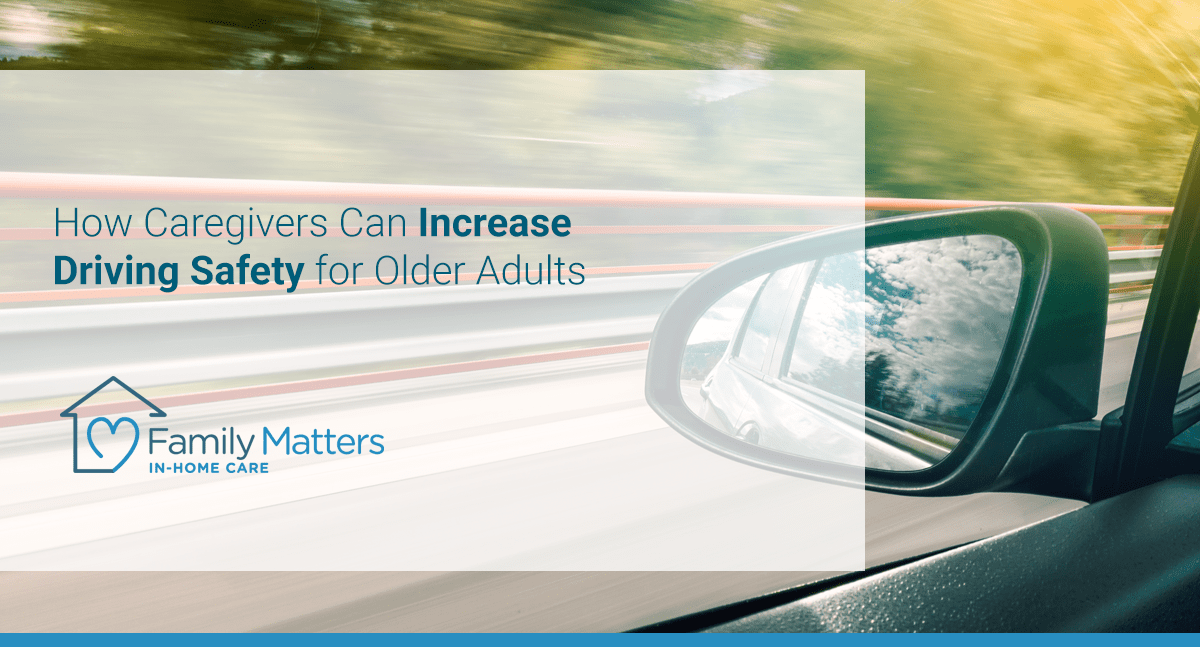
How Caregivers Can Increase Driving Safety for Older Adults
Given 18% of all traffic fatalities are people who are 65 years of age or older, it is important to learn about senior safety on the road.
Changes Influencing Seniors on the Road
Given how experienced most of them are as drivers, it can be hard for seniors to accept there are safety concerns about their driving. It’s important for them to know this isn’t because they are “bad drivers.”
Age-related changes that affect driving for seniors include:
- Limited vision or hearing
- Decreased reaction time, judgment, or attention due to health conditions
- Poor posture
- Weakness when operating a steering wheel, brakes, etc.
- Memory loss that leads to getting lost or confused
- Medications that impair judgment and reaction times
Night-time driving exacerbates the effects of these changes on senior safety as well.
Increasing Driver Safety for Seniors
Encourage seniors to increase their safety on the road with these tips.
- Stay active to maintain flexibility and strength
- Make sure brakes, steering wheel, and seats function smoothly
- Drive at times of day with good visibility
- Keep up to date on vision and hearing checks
- Use adaptors like extra mirrors
- Leave extra space between vehicles and stay below the speed limit
- Ask doctors about medications and their effects on driving
Conversation Starters about Seniors’ Road Safety
Driving can be a sensitive topic for seniors. Use these questions to start conversations:
- Have you noticed any scratches or dents on your car recently?
- Have you experienced anything frightening on the road lately?
- Do any of your medications affect how you feel when driving?
- Are there any signs on your usual route that have been hard to spot?
- What’s the best route to get between (two points senior should be familiar with)?
- Would it be helpful to you if you didn’t have to drive all the time?
Home Care Tip: Many public, private, and non-profit transportation providers offer discounts or free rides to seniors. Contact a local Area Agency on Aging (AAA) for listings near you. For non-emergency medical transportation, contact Medicaid. If a senior is struggling with the idea of driving less, encourage them to try these affordable options and experience how much freedom they will still have.
If you or your family member is considering in-home care as part of a plan to age in place, contact Family Matters In-Home Care today for a free consultation. Our team is dedicated to supporting your family and helping older adults enjoy life in the comfort of their own home for as long as possible.
Some of the services offered by Family Matter In-Home Care include: Alzheimer’s & Dementia Care, Bed & Wheelchair Transfer Assistance, Companionship, Housekeeping & Meal Preparation, Personal Care, Recovery Care, and Transportation.
Serving the San Francisco Bay Area and Greater San Diego, Family Matter In-Home Care has offices throughout California including: Campbell, CA, Roseville, CA, San Marcos, CA, and San Mateo, CA.
Sources:
- https://cdn2.hubspot.net/hubfs/1708580/Marketing%20Monthlies/PDFs%20from%20Windfarm%20Marketing/1219-SeniorsSafeontheRoad-RGB.pdf
- https://www.nhtsa.gov/road-safety/older-drivers
- https://www.nia.nih.gov/health/older-drivers
- https://www.aarp.org/home-garden/livable-communities/info-2005/fs51r_drivers.html
- https://www.nhtsa.gov/road-safety/older-drivers
